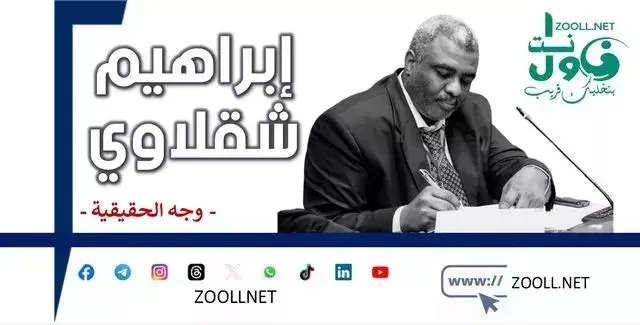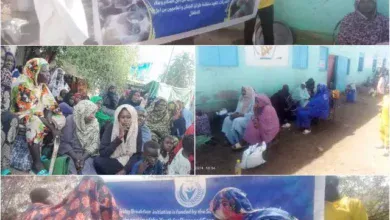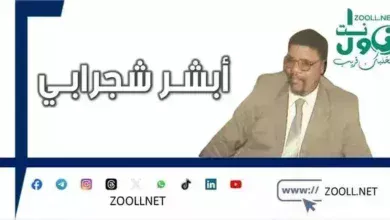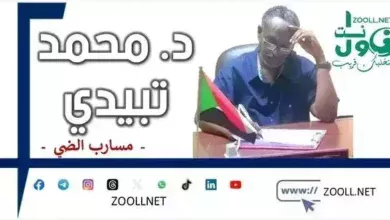The National Congress: Struggle of ideas or struggle for power?! – The face of truth – ✍️ Ibrahim Shaqlawi

Over the past week, the Sudanese political arena has witnessed a divergence of opinions regarding the convening of the Shura of the National Congress Party, which is officially considered dissolved according to the measures taken by the Committee for the Suppression of empowerment following the December 2019 revolution, however, party leaders. We believe that these procedures are invalid and illegal, and that they did not provide for the possibility of appeal. The contentious phase is completed due to the absence of the Constitutional Court, in addition to the nature of the commission which took the dissolution decision, which. was a “political committee”.
This controversy over dissolving the party or moving to a new party to shed the previous legacy was not just a passing event, but rather opened the door to deeper questions about the nature of the conflict within the party: is it a conflict of ideas? about future directions, or is this just a traditional struggle for power between different factions? The evidence is that internal and external political pressures have strongly affected this party, leading to the emergence of disagreements among its leaders on crucial issues. The most important of these topics was the description of the change that occurred in April 2019, whether it was a coup or a revolution, in addition to the differences regarding the policies of the state administration and the party's economic and social policies.
These differences have become clear in multiple situations, including the leadership crisis that has emerged from the insistence on the nomination of President Al-Bashir for the year 2020, to issues such as the handling of the sanctions file. Americans, normalization with Israel and support for the Islamic resistance movement Hamas. . Some of these internal challenges were de facto overcome after the fall of Al-Bashir, but the question of external relations and political vision to deal with regional and international developments remains important and requires comprehensive treatment to ensure the stability of the party, develop its mechanisms and its capacity to keep pace with current changes.
This adds to the confusing political reality created by the December Revolution, which radically affected all political forces, including the National Congress and the Islamic movement in general. The revolution reshaped the Sudanese political map and opened the door to regional and international interventions, taking advantage of the fragile situation inside the country. These repercussions led to a reduction in the role of the National Congress, but they also demonstrated the urgent need for the party to develop its strategy so that it is consistent with the aspirations of its members and the aspirations of the Sudanese people. work to meet the challenges imposed by the transition period. These demands may have created a new reality that led to the emergence of contradictory currents between “reform and renewal” and “traditionalism and conservatism.” Therefore, as observers of this interaction taking place within the National Party see, perhaps this is the case. the agonies which precede the birth of a new phase for this party.
Therefore, according to observers, what is happening in this party is normal in light of the current challenges. This can even be seen as a benign structural development in the party's strategic vision for the future. We can therefore say that there are now “two”. “currents”: a “renewed reformist current” that calls for change and adaptation to the new conditions of the country and the region, and to seek approaches with the international and regional community and sees the need to adopt policies flexible measures that preserve the Sudanese state away from regional influences. and international interference and conflicts in order to guarantee an effective presence of the party on the political scene.
There is a “traditional conservative movement” that clings to previous policies and rejects change, seeking to return to what was before the revolution. This movement, as observers note, has little chance of remaining firm, of meeting the aspirations of the Islamists and repairing their mistakes. injuries, because she participated in the fall and fell with the fall of the regime. This conflict is not limited to internal tendencies alone, but also manifests itself in foreign policy issues, making the future of the party dependent on the extent to which it manages to overcome these divisions or perhaps coexist with they internally within the framework of a conflict of ideas as is now present in the Iranian experience, subject to the ebb and flow between conservatives and reformists, but the unity of the entity remains the strategic objective of the two groups.
There is also a very important issue related to the growing concern of some parties about the presence of the National Congress and Islamist movements in general on the scene and in the political process, especially those that oppose the current government of transition, which some call the transitional government. Fears have increased with Islamists' support for the army and their ability to mobilize Sudanese youth to defend the country during the current war. This is what put the National Congress back in the spotlight and perhaps restored its confidence. Some therefore believe that the integration of the National Congress and Islamists in general into the political dialogue is a necessity. Avoid the monopolization of power by the army and ensure balance in the political scene.
Otherwise, the army could be alone in forming the authority in the aftermath of the war, according to its theses, highlighted several times by Lieutenant General Yasser Al-Atta, deputy commander-in-chief of the army, according to which “the army will manage the post-war scene with a government with national competences.” We must understand that this became possible in light of the conflict and the fragmentation of political parties, as well as in light of the will of the Sudanese people, who made the restoration of security and the establishment of peace top priority. Given these complexities, the Sudanese-Sudanese political dialogue emerges as an essential solution to address the deep differences. Besides the importance of opening channels of communication between the different Sudanese political forces without exception.
This is the only way to contribute to the stability of the country and the construction of an inclusive government that represents the aspirations of the Sudanese people. Therefore, the truth emerges in emphasizing that how this conflict is handled determines the future of Sudan. Therefore, the issue requires a careful reading of its components and dimensions, while seeking solutions that meet the general interest of the Sudanese. Therefore, the success of the National Bank at this stage depends on making rational policy decisions that take into account the complexities of the current scene and make stability and prosperity a primary goal.
May you always be well.
Sunday November 17, 2024 AD. (email protected)





